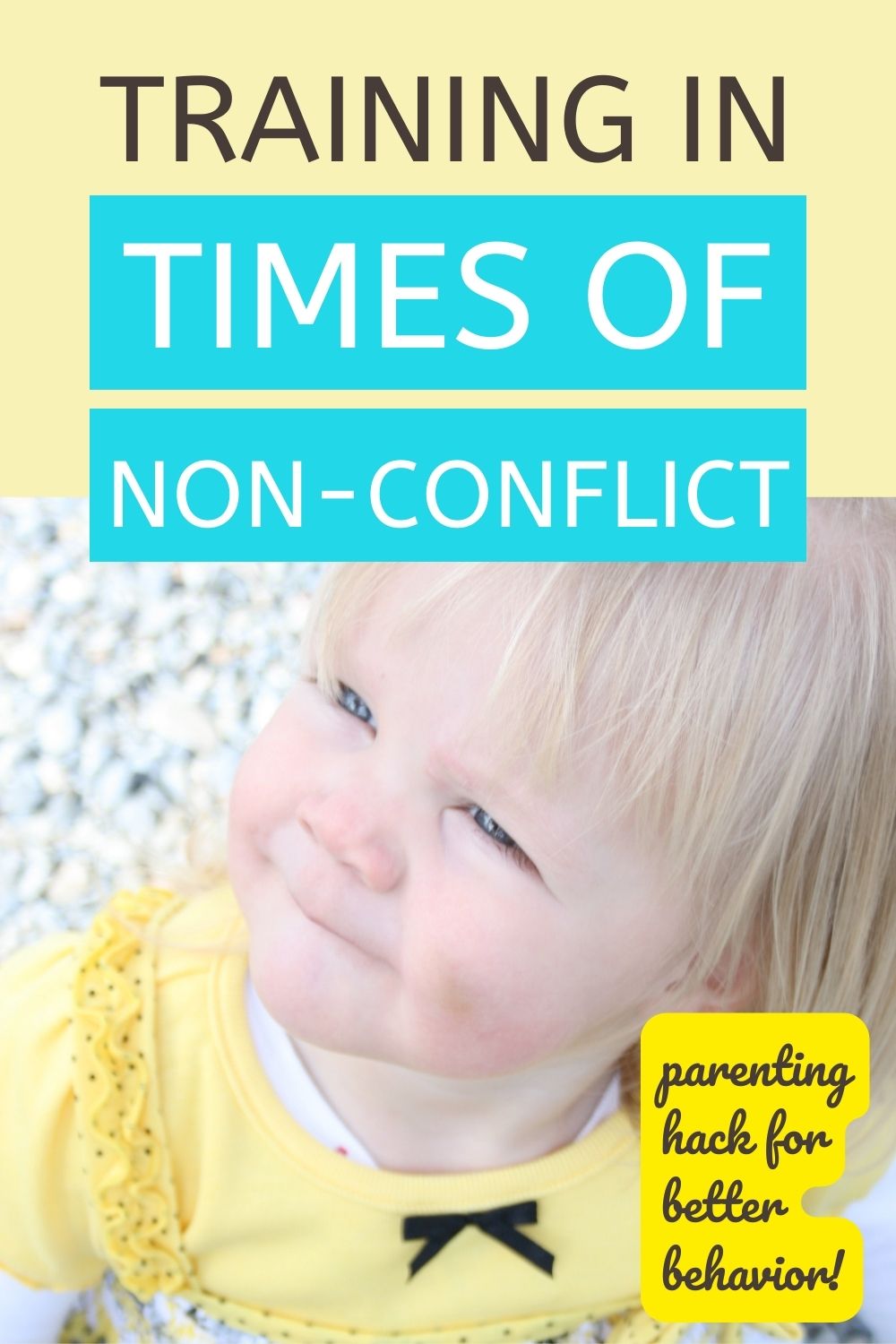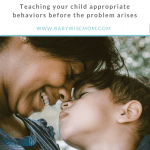How to get your child to obey before there is disagreement or conflict. Obedience training and first time obedience will go better with this helpful tool to teach your child BEFORE there is conflict.

We all know the moment of temporary panic. Your child is doing something you do not want them to do, but you haven’t really ever talked about it before and you are out in public. How do you handle it?
Or maybe you HAVE talked about it with your child before and despite the fact that you have told her it isn’t okay to have a tantrum when it is time to leave the park, she has that tantrum every.single.time.
Enter the parenting tool of training in times of non-conflict.
Post Contents
- What Does Traning in Times of Non-Conflict Mean?
- What Does Non-Conflict Training Look Like?
- Training in Times of Non-Conflict Scenarios
- Scenario 1: Playdate
- Scenario 2: Leaving the park
- Scenario 3: Going out to dinner
- Scenario 4: Church behavior
- Scenario 5: Child hitting other children
- Scenario 7: Library behavior
- Scenario 8: Going to the dentist
- Scenario 9: Behavior at home
- What Age Can You Start Training in Times of Non-Conflict?
- Related Posts
What Does Traning in Times of Non-Conflict Mean?
Training in times of non-conflict means that you teach your child appropriate behaviors before the actual potential problem occurs.
Many times your child will act in a way that is displeasing to you simply because he literally doesn’t know any better.
Sometimes your child knows better but just doesn’t have the tools necessary to react any other way.
Training in times of non-conflict allows you to teach your child what appropriate behaviors are when you are not in the “heat of the moment.’ It is also a time to work out the “kinks” without the benefit of people watching both of you.
We often assume our children just know what is expected of them. This is unfair and also illogical.
A child is not typically born knowing how to greet someone new or to say thank you when something nice is done for them. Some are very socially adept and observe those behaviors, but most need to be taught that.
What Does Non-Conflict Training Look Like?
Here are the steps for non-conflict training:
- Explain the situation to your child as best you can. Tell your child what will happen.
- Explain your expectations of your child in the situation. Tell your child what is okay and what is not okay.
- Ask your child to repeat to you what you have shared and clarify any confusion.
- Practice the expected behavior. Tell your child to pretend they are in the situation and act it all out.
- Tell your child the consequences that will happen (if any) when the rules are not followed.
- When the moment arises, remind your child of the non-conflict training.

Training in Times of Non-Conflict Scenarios
What are some situations you might want to train for? Let’s talk about a few.
Scenario 1: Playdate
Perhaps you have a friend coming over to play with your child.
Training before the conflict would be to tell your child Bobby is coming to play, then going through the motions of what will happen when Bobby gets there. Explain that he will greet Bobby at the door and welcome him there.
Then perhaps they will go to your son’s room to play. Bobby will want to play with your son’s toys. Your son needs to share toys with Bobby. And so forth.
You talk the situation out and even role-play. You can talk about how maybe your child won’t want to share toys, but think about how your child would feel if he went to Bobby’s and Bobby wouldn’t let him share.
You work all of these things out before Bobby even gets there. Then you can give gentle reminders if needed, but your child is mentally and emotionally prepared for what is to come.
Imagine from your child’s perspective what having Bobby over to play would be like WITHOUT some non-conflict training.
Bobby comes over and your child is suddenly admonished for not greeting Bobby at the door. Your child is immediately confused and perhaps embarrassed. Then Bobby goes for your child’s toys and starts getting them out and playing with them.
Imagine if your spouse invited someone over to cook in your kitchen and didn’t give you a heads up first. You might be thrown off, and you are an adult.
Scenario 2: Leaving the park
Let’s talk about another scenario. Perhaps you are going to the park to play. You want to avoid a meltdown when you tell your son it is time to go home. You tell your son what is expected when it is time to leave and do a practice session.
When you get to the park, you ask your child what he should do when it is time to go home. Ask him if it is okay if he screams and cries or runs away from you. This is utilizing Ask and Tell, another great parenting tool.
I had to use this with 2 year old Brayden when Kaitlyn was a newborn. He did NOT want to leave the park when it was time. He would climb up into the playground equipment, leaving me with a newborn and trying to figure out how to get him down.
>>>Read: How To Teach Your Child to Come When Called
Scenario 3: Going out to dinner
Maybe you are going to go out to dinner at a restaurant or friend’s house. You might have different hopes and expectations at a restaurant than you do at home. You cannot expect your child to just know what those expectations are and how to meet them.
You can practice appropriate voice levels and manners at home. You can go over when it is okay to leave the table. You can teach your child how to speak to the server.
Scenario 4: Church behavior
It is possible you have decided it is time for your son to sit more quietly at church. You might have practice church time at home.
I once attended a conference where a woman spoke who had 8 children. She had some twins and all of her children had come closely together. She was determined that they would sit on the front row and be good. They practiced at home each day until her children got it.
>>>Read: How To Keep Your Kids Quiet at Church
Scenario 5: Child hitting other children
No one likes having the child who hits other kids. You will want to talk about this at home and train when your child is not faced with it.
There was a time period one of my girls would hit other kids at the park. She usually did it in retaliation, but I was still not okay with it. We talked about what to do instead and what was okay and not okay. I also explained that if she hit someone, we would immediately leave the park and go home.
It is worth noting that I noticed she tended to hit once it was time for her nap. My other kids had been able to go to the park and play nicely even during their nap, so nap could be skipped or late that day, but for this child, nap still had to start on time.
We need to make sure we set our kids up for success. If your child cannot listen when tired or hungry, don’t take them out when tired or hungry.
>>>Read: How to Handle an Aggressive Toddler
Scenario 7: Library behavior
Your toddler will not naturally know that when they are in the library, they need to whisper and they can’t just go around pulling all of the books off the shelves.
A child entering school is taught proper library behavior and expectations the first time they go to the library. The librarian walks them through it all. If this happens with 5-7 year olds, then we should definitely expect to need to do the same with our little toddlers and preschoolers.
I have written on how to do this extensively in this post: Teaching Kids to Behave at the Library
Scenario 8: Going to the dentist
How scary can the dentist be? Some adults need to be medicated to get through it. Imagine having no idea what is going on and having some stranger with a mask sticking tools into your mouth.
It is kind of unnerving.
This is a great opportunity to going through the non-conflict training. Practice what it will be like. Tell your child what will happen. Focus on the benefits and what the dentist is doing–helping keep teeth healthy and clean! You can hype the situation up.
>>>Read: Prepping for the Dentist using Training In Non-Conflict + Ask & Tell
Scenario 9: Behavior at home
All training in times of non-conflict needn’t be in preparation for social situations. It can be for a happy attitude when it is nap time, clearing dishes after a meal, etc.
The point here is that training your child before it is a battle of wills between the two of you will help prepare you both. You can clearly outline your expectations and have that clear in your head. Your child can be informed of those expectations and learn how to carry those expectations out.
This way, your child knows what is expected. You can refer to what your child knows rather than trying to teach during a meltdown.
What Age Can You Start Training in Times of Non-Conflict?
What age do you start training in times of non-conflict? Probably younger than you think.
You need to decide what age your child is ready, but know that your child understands far more than he can communicate. I started with toddlers.
Keep expectations and instructions age-appropriate, in both directions. Don’t be too hard but also don’t be too easy. This is something that can be so beneficial to both you and child. Give it a try!
Related Posts
- Utilizing “Ask and Tell” to Get Your Kids to Obey in Public
- How to Get Your Child to Obey with a Simple “Yes Mommy”
- How To Respond When Your Child has a Public Tantrum
- Teach Kids What Obedience Looks Like
- How to Prepare Your Child for Great Behavior in Public

This post first appeared on this blog in October of 2008

